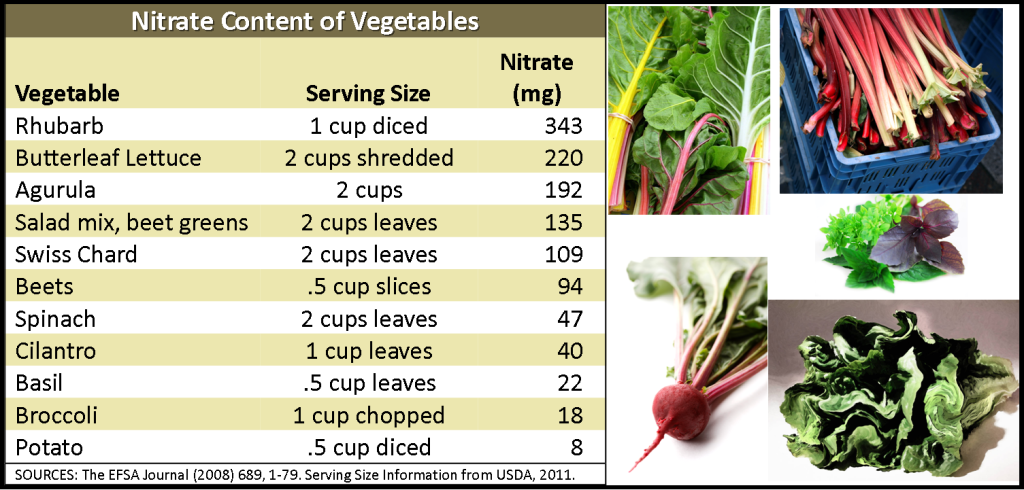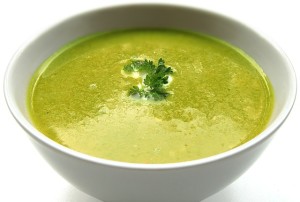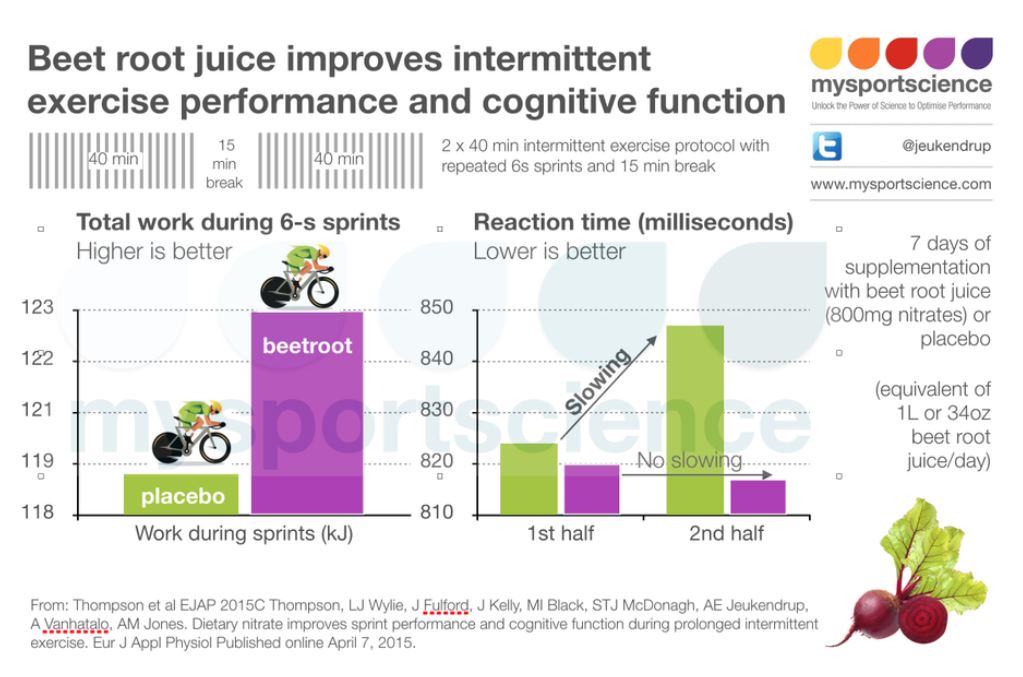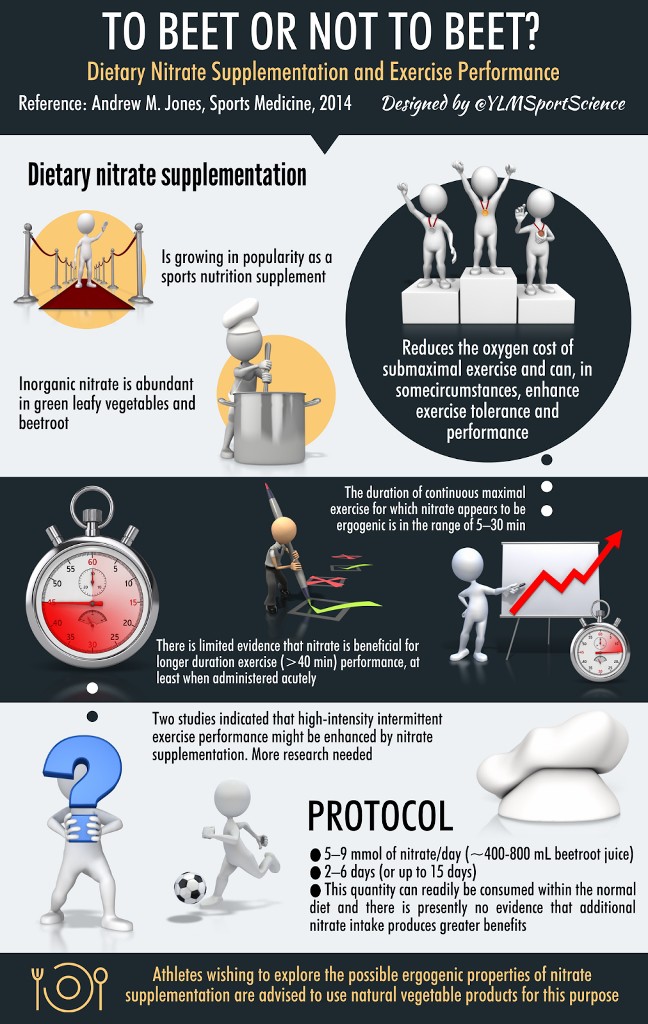The science of nitrates in vegetables continues to evolve, highlighting potential health and sports performance benefits. I have a summary on the athletic performance benefits of beet juice here (the research side is a bit dated): I”ll try to keep this page updated with new research on dietary nitrates and health.
What Are Dietary Nitrates, and
How Might they Promote Health?
Nitrates are inorganic compounds found naturally in soil and water. Until recently, nitrates were considered toxic, and long-term exposure thought to increase cancer risk, which is at odds with the growing body of research highlighting the protective effects of vegetables, many of which are nitrate-rich. In fact, dark leafy greens, which are the richest vegetable sources of nitrates, are all-stars when it comes to promoting health. Many experts question these early studies, and now believe that the naturally occurring nitrates in vegetables may be responsible for some of the cardiovascular benefits of vegetable-rich diets. It’s important to remember that nitrates in vegetables occur naturally and come packaged with a host of health-protective compounds (minerals, vitamins, antioxidants).
Dietary nitrates can make muscles more efficient. Our bodies convert the nitrate in vegetables to nitrite, some of which is converted into nitric oxide. Nitric oxide’s role in regulating blood pressure and promoting cardiovascular health is well-established, and research continues to uncover its many health-promoting roles in our body. Nitric oxide regulates vasodilation, relaxing blood vessels and improving blood flow, which could allow more oxygen to reach the muscles. Nitrates influence on athletic performance is a relatively new area of research. It seems that nitric oxide helps muscle mitochondria become more efficient.
Leafy greens are some of the best nitrate sources. By weight, arugula is the clear winner, boasting 480 mg nitrates/100g (almost twice as much as a cup of beet juice). But that’s 5 cups of arugula. . . so I”ve made a table (below) that lists some nitrate levels based on more reasonable serving sizes. Note that nitrate values are approximate, since content varies considerably depending on soil, location, time of year, and other variables.
 You can get an idea of the nitrate content of other vegetables in this table or this publication. Remember – a health-promoting diet should include nutrients from a variety of vegetables, so don’t limit your vegetable intake to high-nitrate varieties. Consider that broccoli and carrots, which are low in nitrates, offer plenty of disease-fighting nutrients.
You can get an idea of the nitrate content of other vegetables in this table or this publication. Remember – a health-promoting diet should include nutrients from a variety of vegetables, so don’t limit your vegetable intake to high-nitrate varieties. Consider that broccoli and carrots, which are low in nitrates, offer plenty of disease-fighting nutrients.
Research Updates
Here are some highlights of the recent research on dietary nitrates.
Habitual Dietary Nitrate Intake in Highly Trained Athletes.
This paper looks at the habitual dietary nitrate intake and identify the main contributing food sources in a large group of highly trained Dutch athletes. Researchers concluded “median daily intake of dietary nitrate in highly trained athletes was 106 mg, with large inter-individual variation. Dietary nitrate intake was strongly associated with the intake of vegetables. Increasing the intake of nitrate-rich vegetables in the diet might serve as an alternative strategy for nitrate supplementation. Int J Sport Nutr Exerc Metab. 2016 Oct 21:1-25. [Epub ahead of print]
Diet high in nitrate-rich vegetables & fruits helps exercise performance
A study published in the Journal Nutrients suggests that a high-nitrate diet (e.g., rich in spinach/collard greens) could be a feasible and effective strategy to improve exercise performance. (Nutrients 2016, 8(9), 534; doi: 10.3390/nu8090534)
Beyond Beets – Spinach and Arugula Help Lower Blood Pressure
New research published in the Journal of Nutrition shows that arugula, spinach, and beets help lower blood pressure to a greater extent than sodium nitrate. (J Nutrition, April 2016).
Whole Beets vs. Juice for
Improving Athletic Performance
NutritionFacts.org summarizes the nitrate research in a short video that looks at new research using beets instead of beet juice to improve athletic performance and vascular function. (Sep 28, 2015 · Michael Greger, M.D.)
Consumption of nitrate-containing vegetables is inversely associated with hypertension in adults
This research adds to the growing evidence that nitrate-rich vegetables can help control high blood pressure. In the 3-year study, researchers found that those who ate more nitrate-containing vegetables had a lower risk of high blood pressure. This study included celery, lettuce, and spinach as “high nitrate” vegetables. Journal of Nephrology
Nitrate-rich foods (spinach soup!) can improve vascular health and lower blood pressure

A study published in the journal Clinical Nutrition Research showed that eating nitrate-rich foods can improve vascular health. Researchers from the University of Toronto compared week-long consumption of a daily bowl of soup: either a high-nitrate soup (made with spinach) or a low-nitrate soup (made with asparagus). They found that the spinach soup decreased arterial stiffness after eating it, and lowered blood pressure after 7 days of eating the soup. The authors conclude that
“the study provides support to the potential use of whole food, un-concentrated dietary nitrate found in natural, commonly consumed vegetables like spinach, as an effective way to aid in maintenance of cardiovascular health.” (Clin Nutr Res. 2015 Jul; 4(3): 160–167)
A green diet-based approach to cardiovascular health?
A study titled “A ‘green’ diet-based approach to cardiovascular health? Is inorganic nitrate the answer?” looks at the beneficial effects of dietary nitrates on health and reviews the evidence of dietary nitrates for the treatment of cardiovascular disease. (Mol Nutr Food Res. 2015 Aug).
Nitrates linked to improved sprint performance
and cognitive function
This study looked at the effects of dietary nitrates on repeated sprint performance and cognitive function. Investigators mimicked a team sport scenario (repeated sprints) and found that beet juice improved repeated sprint performance and lessened the expected decrease in decline in cognitive function and reaction time. (European Journal of Applied Physiology, April 2015)
Exercise physiologist and sports nutritionist Asker Jeukendrup provides a nice overview of the study here, which he summarized in the graphic below.
Why Nitrate Supplementation
May Increase Athletic Performance
New research in the FASEB Journal suggests that nitrate — a nitric oxide metabolite — meets tissue oxygen demands without the side effects of increasing red blood cells or blood viscosity. (FASEB J. March 2015 29:1102-1112; doi:10.1096/fj.14-263004).
Nitrates in Vegetables Have Many Potential Benefits
Researchers from the Universities of Southampton and Cambridge conducted three new studies that add to the evidence on health benefits of nitrates, suggesting that nitrate-containing vegetables can improve the heart’s efficiency, blood supply to organs, and reduce risk of diabetes and obesity. (FASEB j November 24, 2014; J Physiol 592:4715-31, 2014; Diabetes, 2014 DOI: 10.2337/db14-0496).
Beet Juice Enhances Exercise-Related
Vasodilation in Older Adults
In young people, blood vessels dilate in response to challenging exercise to help oxygen get to the active muscles, and nitric oxide is an important factor in this response. Nitric oxide regulates vasodilation, relaxing blood vessels and improving blood flow, which could allow more oxygen to reach the muscles. Additionally, it seems that nitric oxide helps muscle mitochondria become more efficient.
Studies have shown that in older adults, this vasodilation response is attenuated because their is less nitric oxide signaling. In this study, researchers found that ingesting dietary nitrates (which the body converts to nitric oxide) helps overcome this limitation: older adults (64 years) who drank beet juice before an exercise task had improved compensatory vasodilation compared to when they didn’t drink beet juice. (Journal of Applied Physiology, 15 Jan, 2015).
Beets aren’t the only source of dietary nitrates. Consider these healthy vegetables, which are also rich in nitrates: rhubarb, arugula, spinach, celery, cress, chervil, lettuce, beets, chinese cabbage, endive, fennel, kohlrabi, leek, and parsley.
This study adds to the growing evidence suggesting that dietary nitrates are important for health.
Beets Benefit Athletes and Heart Failure Patients
The research on beets continues to reveal the health-promoting properties of dietary nitrate, with one of the latest studies showing that beet juice can increase blood flow to fast-twitch muscle fibers. These researchers also suggest that beet juice might improve the quality of life for heart failure patients by increasing oxygen delivery to muscles. (Nitric Oxide, October 2014).
I have written about earlier research on beets and endurance here. Most of the studies use beet juice, likely because it’s consistent with other studies, has stable nitrate levels, and has a good placebo (nitrate-free beet juice). But other nitrate-containing vegetables might have similar benefits: One study found that a diet rich in traditional Japanese foods (plenty of leafy greens) increased plasma nitrite levels and lowered blood pressure, showing that high-nitrate vegetables other than beets may also increase nitric oxide levels.
Dietary Nitrate and Exercise Performance
Exercise physiologist Yann Le Meur produced this graphic to summarize an excellent review of dietary nitrate and performance by expert Andrew Jones (Sports Medicine, May 2014, Volume 44, Issue 1 ).
Veggies Can Power Muscle Contraction
A growing body of research is showing that the nitrates in vegetables can promote heart health. Scientists found that volunteers who supplemented their diets with beet juice (high in dietary nitrates) had more powerful muscle contractions. (Medicine & Science in Sports & Exercise, March 2014.)
More Reading on Dietary Nitrates . . .
- Interview with physiologist and beetroot expert Prof Andrew Jones (Asker Jeukendrup, mysportscience.com)
- Dietary nitrate improves sprint performance and cognitive function during prolonged intermittent exercise (European Journal of Applied Physiology, April 2015)
- Dietary Nitrate: The New Magic Bullet? (Nice review by nitrate and performance researcher Andy Jones, Gatorade Sports Science Institute)
More Sports Nutrition Articles
- Nutrition Strategies for Health and Athletic Performance
- Athletes Avoiding Gluten and Grains: Is There Good Evidence?
- The Iron Needs of Athletes: Who Needs More, and How to Get it Through Your Diet
- Healthy or Hype? Chocolate Milk for Recovery
- How Much Protein Do You Need?
- What Should I Eat Before I Workout?
- Energy Bars: What to Look for, Real Food Alternatives, and How to Make Your Own
- Will Beet Juice Improve Endurance Performance?
- Refueling for Recovery
- You Fuel your Workouts, but How Does the Rest of your Diet Stack Up?
__________
Updated October 25, 2016
Share This:
